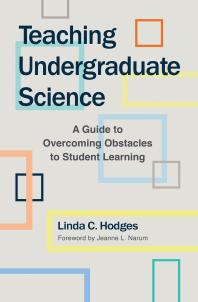Product desciption
Teaching Undergraduate Science A Guide To Overcoming Obstacles To Student Learning 1st Edition Linda C Hodges Jeanne Narum by Linda C. Hodges; Jeanne Narum 9781620361771, 1620361779 instant download after payment.
This book is written for all science or engineering faculty who have ever found themselves baffled and frustrated by their undergraduate students' lack of engagement and learning. The author, an experienced scientist, faculty member, and educational consultant, addresses these issues with the knowledge of faculty interests, constraints, and day-to-day concerns in mind. Drawing from the research on learning, she offers faculty new ways to think about the struggles their science students face. She then provides a range of evidence-based teaching strategies that can make the time faculty spend in the classroom more productive and satisfying. Linda Hodges reviews the various learning problems endemic to teaching science, explains why they are so common and persistent, and presents a digest of key ideas and strategies to address them, based on the research she has undertaken into the literature on the cognitive sciences and education. Recognizing that faculty have different views about teaching, different comfort levels with alternative teaching approaches, and are often pressed for time, Linda Hodges takes these constraints into account by first offering a framework for thinking purposefully about course design and teaching choices, and then providing a range of strategies to address very specific teaching barriers - whether it be students' motivation, engagement in class, ability to problem solve, their reading comprehension, or laboratory, research or writing skills. Except for the first and last chapters, the other chapters in this book stand on their own (i.e., can be read in any order) and address a specific challenge students have in learning and doing science. Each chapter summarizes the research explaining why students struggle and concludes by offering several teaching options categorized by how easy or difficult they are to implement. Some, for example, can work in a large lecture class without a great expenditure of time; others may require more preparation and a more adventurous approach to teaching. Each strategy is accompanied by a table categorizing its likely impact, how much time it will take in class or out, and how difficult it will be to implement. Like scientific research, teaching works best when faculty start with a goal in mind, plan an approach building on the literature, use well-tested methodologies, and analyze results for future trials. Linda Hodges' message is that with such intentional thought and a bit of effort faculty can succeed in helping many more students gain exciting new skills and abilities, whether those students are potential scientists or physicians or entrepreneurs. Her book serves as a mini compendium of current research as well as a protocol manual: a readily accessible guide to the literature, the best practices known to date, and a framework for thinking about teaching.


